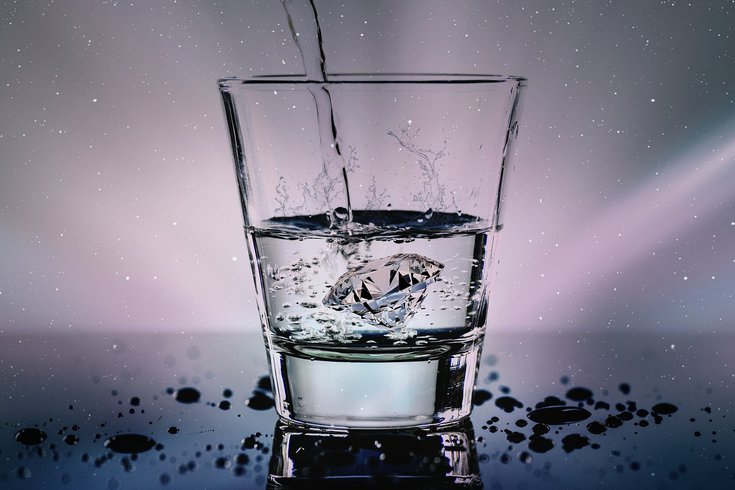
March 22, 2022
 Coco Parisienne/Pixabay
Coco Parisienne/Pixabay
Men should be drinking 15.5 cups of fluids each day, according to the U.S. National Academies of Sciences, Engineering and Medicine. Women should consume about 11.5 cups.
Water is essential for survival; if people don't adequately replenish lost fluids, it can affect their bodies' abilities to function properly. After all, water makes up the majority of the body.
Dehydration – whether from illness, overexertion or heat – can cause serious health complications when it's not properly treated. The symptoms of dehydration, however, are not always easy to identify.
When dehydrated, the body not only needs water, but it also needs electrolytes like salt and potassium, which help the body function. Everything from one's heart rate, kidney function and abilities to move and breathe can be affected.
The World Health Organization defines extreme dehydration as losing more than 10% of one's body weight in fluids. The symptoms of mild dehydration start to occur after losing about 5% to 6% of one's body weight in fluids.
The first signs a person is losing too many fluids are usually thirst, fatigue, dizziness or constipation. Urine that is a darker yellow or orange also could be a warning sign.
Other complications of dehydration, however, may be more surprising. Here's what else experts say to also for:
Bad breath: When your body isn't able to produce enough saliva, the bacteria in your mouth will grow, causing bad breath. If your mouth is dry and your breath is not smelling so sweet, it could be because you need to hydrate.
Changes in the skin: Dry or flushed skin may also be signs of dehydration. So is skin that doesn't return to its normal, flat appearance immediately after being pinched.
Muscle cramps: Both hot weather and changes in electrolytes can cause muscles to cramp because they are forced to work harder. If you find that your muscles keep cramping, especially when you are working out or exerting yourself in some way, it could be a sign that you need more fluids. Dehydration also can cause these cramps when people are lying down to rest. One study found that to prevent muscle cramps, consuming drinks with electrolytes after exercising is more effective than plain water.
Headaches: Even mild hydration can cause a headache. And if you have a history of migraine headaches, dehydration could be a common trigger. When you feel a headache coming on, try to drink a full glass of water and continue to monitor your fluid intake during the day to lessen the pain.
Spike in heart rate: When you are dehydrated, your blood volume decreases. This causes your heart to beat faster, which affects both your heart rate and blood pressure. Extra sodium in the blood also can thicken it, making it more difficult for blood to circulate throughout the body.
Dip in oxygen levels: Dehydration also can affect the ability of your lungs to function properly. A significant drop in blood oxygen saturation – the amount of oxygen in the blood – could lead to organ damage.
Tingling sensations: If you are experiencing tingling throughout your body, especially in your hands and feet, low fluid levels may be the culprit. The tingling could be caused by another factor, so it is recommended that people get evaluated by a health care provider.
When left untreated, dehydration increases the risk of serious health complications, including urinary tract infections, kidney stones and kidney failure, seizures and low blood volume. It also boosts the risk of hypovolemic shock – when low blood volume causes a drop in blood pressure and the amount of oxygen in the body.
Severe dehydration can lead to rhabdomyolysis, a rare condition in which the muscles break down. According to the Cleveland Clinic, muscle cells release a protein called myoglobin into the blood when they are breaking down. Too much of it can damage the kidneys, causing kidney failure and death. Too much exercise without proper recovery time is also a risk factor for this condition.
According to the U.S. National Academies of Sciences, Engineering and Medicine, men should be drinking 15.5 cups, or 3.7 liters, of fluids and women about 11.5 cups, or 2.7 liters.
People who are feverish, throwing up or experiencing diarrhea particularly need to watch their fluid intakes. There is not an exact amount of extra fluid needed when sick, but doctors recommend increasing intake to replenish lost fluids.
It is important to watch for the signs of dehydration when ill. Just be careful of consuming too many fluids. Overhydration comes with its own set of health complications.
People should start properly hydrating the day before a big workout and then replenish their fluids at regular intervals while exercising and afterward. During the activity, some experts recommend people drink 7-10 ounces of fluid every 10-15 minutes.
To calculate fluid loss, weigh yourself before and after an activity. A 1-3% loss in body weight indicates dehydration, experts say. For every pound lost, drink 20-24 ounces of water or sports beverage. The goal is to replace losses within two hours after the activity.
The University of Pittsburgh Medical Center advises people to calculate how much fluids they lose during a strenuous activity by weighing themselves before and after the activity. The rule of thumb is that every pound lost requires 20-24 ounces of water or sports beverage to replace it. And the fluids should be replaced within two hours of the activity.
To help stay properly hydrated every day, doctors advise people to keep a water bottle with them throughout the day. Snacking on fruits and veggies also is a good way to replenish fluids.